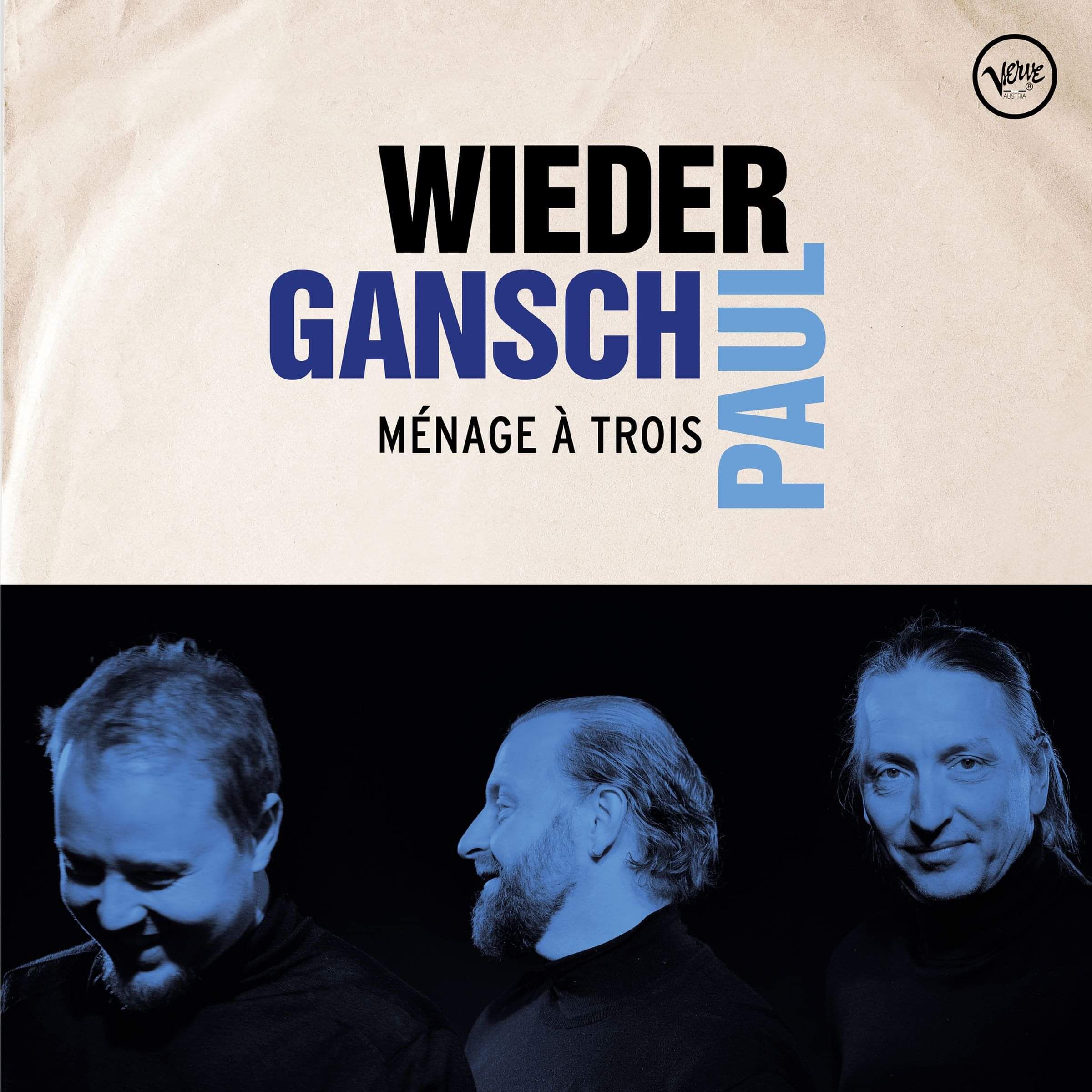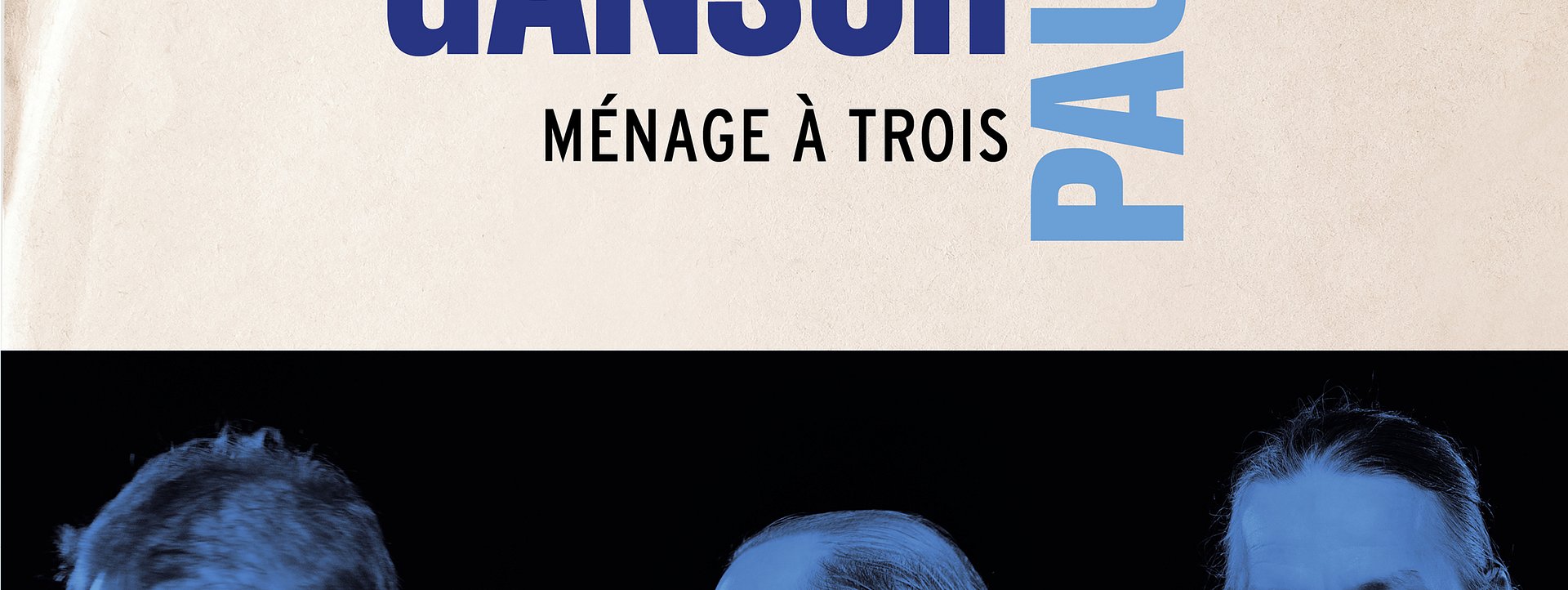
Wieder - Gansch - Paul, Ménage à Trois
Interprets: Albert Wieder, Thomas Gansch, Leonhard Paul
Titel: Ménage à Trois
Music: (1.)Faith, written by George Michael, arranged by Wieder, Gansch & Paul, (2.) The Breeze, written by Ernesto Lecuona, arranged by Wieder, Gansch & Paul, (3.) Der Vielharmonische, written by Leonhard Paul, arranged by Leonhard Paul, (4.) Tombo In 7/4, written by Airto Moreira, arranged by Wieder, Gansch & Paul, (5.) Where Is Ahmad ?, written by Thomas Gansch, arranged by Wieder, Gansch & Paul, (6.) Die Kaiserbluesette, Kaiser Walzer Opus 437, music by Johann Strauss II, music by Toots Thielemans, arranged by Wieder, Gansch & Paul, (7.) If I Never Sing, written by Udo Jürgens, arranged by Albert Wieder, (8.) Stompin' Sentimental, written by Leonhard Paul, arranged by Leonhard Paul, (9.) Star Trek, music by Alexander Courage, arranged by Wieder, Gansch & Paul, (10.) Isn't She Lovely, music by Stevie Wonder, arranged by Wieder, Gansch & Paul, (11.) James, written by Billy Joel, arranged by Leonhard Paul, (12.) Ständchen, music by Franz Schubert, arranged by Leonhard Paul, (13.) Land of Make Believe written by Chuck Mangione, arranged by Wieder, Gansch & Paul, (14.) The Days of Wine And Roses, written by Henry Mancini, arranged by Wieder, Gansch & Paul
Label: Verve
release: 29.11.2019
Music information to the wine
Wieder Gansch & Paul
"Of course, art should also shake us up, expose us, and make us aware of painful things, but that cannot be its only task. It must also strengthen our capacity for happiness." That's what Udo Jürgens said toward the end of his creatively fruitful life. His dogma was famously "entertainment with attitude," and trumpeter Thomas Gansch has clearly internalized it. As a musician who passionately crosses genre boundaries, musical enclosure thinking has always been alien to him. The man opens the floodgates of milieu with great joy. He confronts free jazz purists with Caterina Valente melodies, fans of affected classical music with dazzling big band blares. He poaches in folk music and metal, film scores and pop music. In all subgenres of jazz, of course. The man is a musical anarchist, some would call him a cosmoproletarian, someone who puts aside the lofty pretensions of genres and transforms them into multifaceted dimensions of enjoyment.
This also happens in his very latest small ensemble, "Wieder, Gansch & Paul." Named after his fellow musicians in an egalitarian gesture, trombonist Leonhard Paul was a co-founder of Mnozil Brass, the most famous combo to date of Gansch's creative diversification. Born in 1967, he was an early fan of trombonist Ray Anderson, who quickly became his all-time hero. Paul studied with the strict Erich Kleinschuster, who liked him after "three attempts." Paul tried his hand at teaching at the age of 23. He also met Gansch early on. They played together for the first time in 1996. And they did so at the Musikverein, of all places, under the baton of Gilbert Kaplan, a man who devoted himself exclusively to Mahler's Second Symphony, the "Resurrection Symphony." What Paul appreciates about Gansch is that, when in doubt, he chooses the more pointed, sometimes rustic solution. Paul alternates with great emphasis between the eccentric repertoire of Mnozil Brass and formations that play "lower-pitched folk music." On stage, Paul benefits from a breathing system that is diametrically opposed to Gansch's. What Paul appreciates about the new trio format is the quiet harmony between the musicians. And the courage to create gaps in the sound. "You always have to give something up," he says quite relaxed.
The third member of the group is tuba player Albert Wieder, who hails from the red wine region of Burgenland. He originally only briefly filled in for Mnozil Brass, then played in the raucous combo for a year and a half. During this time, it became a pleasant habit to play encores as a trio. This has organically evolved into a trio that can be proud of the sounds they create together. His fellow musicians value his sensual playing the most. "Sometimes it looks as if he's cuddling his tuba," one female admirer once remarked.
As with Mnozil Brass, this trio's heterogeneous repertoire captivates on its debut album. The melodic swirl begins flamboyantly with a gently pulsating interpretation of Stevie Wonder's soul classic "Isn't She Lovely." Three melodic strands intertwine intimately to create an apotheosis of sensuality. Sparks of eroticism are already flying. Subsequently, the three musicians unpack motifs from all winds and tastes. This is important in times when the fringes are becoming increasingly politically radical. Wieder, Gansch & Paul are aware of these ambivalences and accept them, even celebrate them. The heterogeneity of their new repertoire is best described using a term from earlier times: "potpourri."
Earthy original compositions like "Der Vielharmonische" and "Where Is Ahmad" by Gansch and Paul enchant, but so do plenty of other works. For example, "Tombo in 7/4" by the Brazilian percussion prodigy Airto Moreira. Originally a piece from his legendary 1970s album "Fingers," it was sampled in 1997 by the digital German combo Bellini in "Samba De Janeiro," becoming a global hit. Again, Gansch & Paul catapult it back into a local context, and suddenly the exotic, wobbly piece acquires a lovely alpine touch that easily lends locals a sense of certainty. George Michael's rocking disco smash "Faith" is also radically reinterpreted. In this idiosyncratic interpretation, the patinated hit takes on the feel of turbocharged New Orleans marching music.
Of course, some of the more melancholic passages are also charming. Franz Schubert's "Ständchen" implores erotic ghostly apparitions in exemplary fashion. Henri Mancini's sublime "Days Of Wine And Roses" takes us back to times when emotional outbursts could only be tamed with a choir and orchestra. Wieder, Gansch & Paul naturally forgo the large instruments. "There's nothing missing with the three of us. Everything works out," says Thomas Gansch about the dreamlike interplay with his colleagues on this magnificent ballad. Tasteful pathos then prevails in the interpretation of Udo Jürgens' apocalyptic "If I Never Sing Another Song," which Sammy Davis Jr. and Shirley Bassey delivered with perfect vocal form. The present trio version is also official. Fatalism and agony flirt intimately here.
Again, Gansch & Paul take off into space at a measured pace with Alexander Courage's "Star Trek" theme, become entangled in nostalgic dreams of monarchy in "Kaiser Bluesette," and ride across the Croatian prairie, where "Winnetou" was once filmed, to the wonderfully childlike melody of "The Breeze and I." They bravely explore the innovative and deviant potential of these pieces without falling into the trap of slickness. Indeed, one could say they are fundamentally unwieldy towards any claim to perfection. This is about music, not juggling notes. Last but not least, this nimble trio takes us to Chuck Mangione's "Land of Make Believe," a magical land and quirk-tolerant alternative universe. Everything was recorded and edited in analog at the Casino Baumgarten. Everything stays better.
Samir H. Köck
the following wine was sonicated by this music......

Chardonnay 2019
Artists: Wieder Gansch Paul
Wine Maker: Bernd Kornherr
Origin: Austria, Lower Austria, Wine Quarter, Untermarkersdorf
Alcohol: 12,5 %
